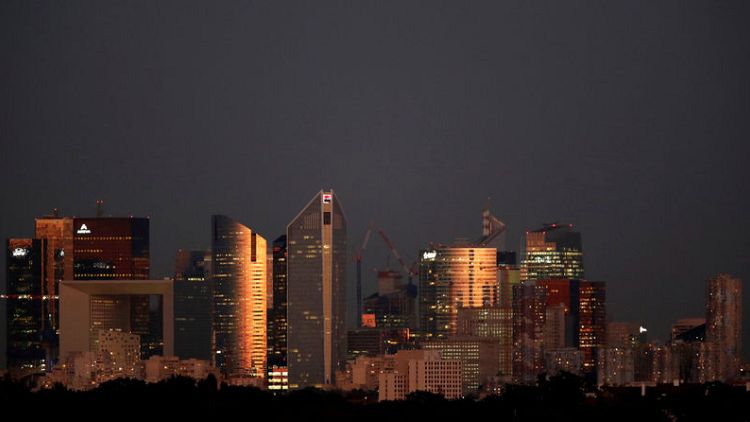By Michel Rose and Michael Nienaber
PARIS/BERLIN (Reuters) - Strong domestic stimulus is helping France shrug off a global slowdown even as export-dependent Germany heads closer to a recession, starkly divergent data on the euro zone's two leading economies showed on Wednesday.
France saw national output rise 0.3% in the third quarter - defying forecasts for slightly slower growth - as unemployment in Germany rose faster than expected and its chambers of commerce warned that exports would shrink next year for the first time since the financial crisis as trade friction mounts.
The contrast in national fortunes was underlined as incoming European Central Bank chief Christine Lagarde doubled down on her predecessor Mario Draghi's calls on Germany to use some of its budget surplus to invest in growth-enhancing measures.
"Those that have the room for manoeuvre, those that have a budget surplus, that's to say Germany, the Netherlands, why not use that budget surplus and invest in infrastructure? ... Why not invest in education, why not invest in innovation, to allow for a better re-balancing?" she told France's RTL broadcaster.
German Finance Minister Olaf Scholz, who can expect 4 billion euros (£3.5 billion) more in tax revenue than initially predicted this year, rejected the impression that Berlin was not doing enough, pointing to record-high public investment levels.
"It's clear that a lot of people expect a big investment push from us and that's why I pointed out at the beginning that the federal budget already foresees higher investments," Scholz said.
Scholz also showed no willingness to ditch Berlin's balanced budget policy of no new debt and increase public investments through borrowing within the means of Germany's constitutionally enshrined fiscal rules that allow a small budget deficit.
FRENCH BOOST
France's economy, which has long relied more on domestic consumption than that of its northern neighbour, got a boost from President Emmanuel Macron's injection of 10 billion euros in stimulus to quell the "yellow vest" protests this year.
Most of that money went on lifting benefits for minimum-wage earning workers. Paris has also said it would cut taxes by more than 10 billion euros next year.
"At the same time, measures enacted in recent years ... have contributed to make the French labour market more flexible and have lowered labour costs for corporates," JP Morgan's Raphael Brun-Aguerre said of reforms begun under Macron's predecessor Francois Hollande and pursued by him.
A separate read-out by the European Commission in Brussels showed that economic sentiment across the 19-country euro zone deteriorated in October for a second straight month as pessimism in industry spread to services and consumers.
A breakdown showed that sentiment fell in Germany for the second straight month and to its lowest level in more than six years. France also saw a small dip but remained above the euro zone average.
The Germany economy shrank 0.1% in the second quarter, and third-quarter output figures next month are expected to show another fall, putting the country in recession by the standard definition.
Export-reliant Germany is also more exposed than most to the disputes triggered by U.S. President Donald Trump's "America First" policies and a cooling of Chinese growth.
"For our economy, with its strong industrial core, this is a huge challenge," DIHK Chambers of Industry and Commerce President Eric Schweitzer said when presenting the association's latest business sentiment survey of more than 28,000 managers.
DIHK said it expects Germany's annual export growth to wither to 0.3% this year from 2.1% in 2018, adding that exports are likely to shrink by 0.5% next year. Germany has in recent years averaged export growth of around 5.5%, Schweitzer said.
Data from the Federal Labour Office showed the number of people out of work increased by 6,000 to 2.287 million in seasonally adjusted terms. That compared with the Reuters consensus forecast for a rise of 2,000.
The jobless rate held steady at 5.0%. That was slightly above the record German low of 4.9% reached earlier this year and much lower than the 8.5% recorded in France in the second quarter, itself the lowest level reached since the end of 2008.
Draghi's acknowledgement after re-launching ECB asset purchases in September that monetary policy could not go much further to help the euro zone has added to pressure on Germany in particular to adopt a more expansionary policy.
Chancellor Angela Merkel has consistently rejected those calls, with Scholz saying that Berlin is already using the room for manoeuvre created by lower borrowing costs to spend where necessary.
(Reporting by Michel Rose and Michael Nienaber; Additional reporting by Francesco Guarascio in Brussels; Writing by Mark John; Editing by Hugh Lawson and Lisa Shumaker)



